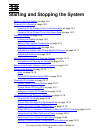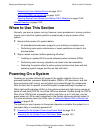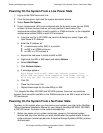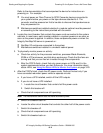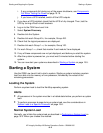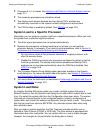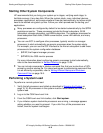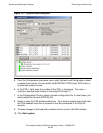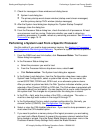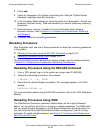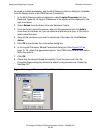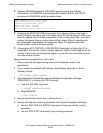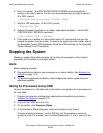
Starting and Stopping the System
HP Integrity NonStop NS-Series Operations Guide—529869-005
15-9
Starting Other System Components
Starting Other System Components
HP recommends that you bring your system up in stages, verifying each stage, to
facilitate recovery if any step fails. When the system starts, many individual devices,
processes, applications, and communications lines start automatically, but others might
need to be started using start up files. Follow your site’s procedures for starting your
applications.
•
Many processes are configured by default to be started automatically by the $ZPM
persistence monitor. These processes include the Kernel subsystem, SLSA
subsystem, storage subsystem, and WAN subsystem. The manager processes for
these subsystem start disks, SWAN concentrators, some LAN devices, and many
processes.
•
You can use SCF to configure other processes, typically monitor or manager
processes, to start automatically as generic processes when the system starts.
For example, you can use the SCF interface to the Kernel subsystem to add these
processes to the system configuration database:
°
$ZEXP, the Expand manager process
°
$ZPMON, the OSS monitor process
For more information about configuring generic processes to start automatically,
refer to the documentation in Related Reading on page 15-24.
•
You can include commands in startup command files that you invoke from a TACL
prompt or another startup file. For some techniques to make startup command files
run as efficiently as possible, refer to Writing Efficient Startup and Shutdown
Command Files on page 16-9.
Performing a System Load
To perform a normal system load:
1. Verify that all processors are halted as described in Stopping the System on
page 15-16. All processors in the system must be halted before you initiate a
system load.
2. Log on to the OSM Low-Level Link.
3. From the OSM Low-Level Link toolbar, click Start system.
4. If you initiate a system load while processors are running, a message appears
asking whether you want to proceed. If you click Yes, all the processors are
halted, then the system load begins.



